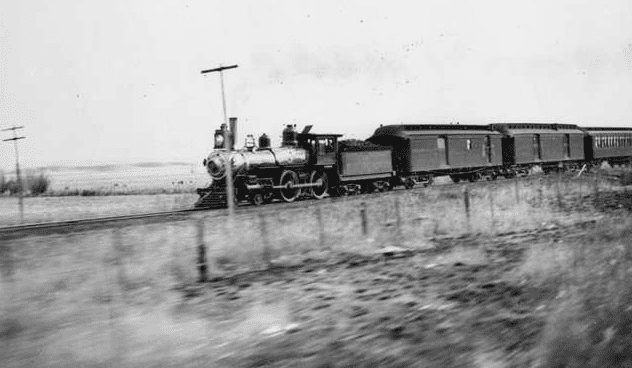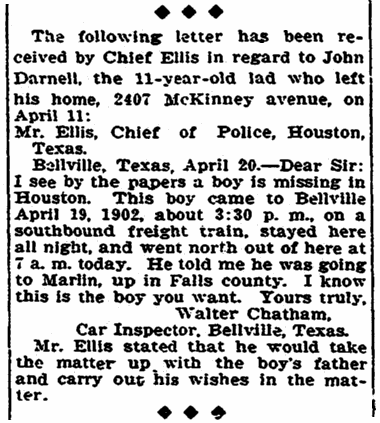Introduction: Gena Philibert-Ortega is a genealogist and author of the book “From the Family Kitchen.” In this blog article, Gena searches old newspapers to learn about her Chatham ancestors in Texas.
Everyone loves a story – and a story is infinitely better when it involves your family. RootsTech presentations this week have been stressing the importance of telling the stories of our ancestors’ lives – but the government records and official documents we rely on often provide cold, dry facts and not a lot of information to fill in a story. Stories require context and detail.
That’s where a collection of newspapers, such as GenealogyBank’s Historical Newspaper Archives, really helps a genealogist.

The Chathams of Bellville, Texas
I know that my paternal great-grandfather Joseph Chatham worked for the railroad. Where he grew up in Texas, the Santa Fe Railroad was a major employer. Not only did he work for the railroad once he married and started his family, but his brother Walter also made a career of the railroad. Instead of driving or riding on the train as an engineer, brakeman or conductor, both brothers spent at least some of their time working in the roundhouse. Joseph eventually moved his family north to Southern California because of health issues.
Joseph died in Northern California in 1940. I know about him because of stories from his grandchildren whom I’ve interviewed. Family members still living remember Joseph in his later years. I have spent time gathering documents about his life including marriage and death certificates, cemetery records, and copies from the family Bible where he noted the births and deaths of his parents, siblings, and children. Similarly, discussions with Walter’s descendants, a trip to Texas, and online research have unearthed documents about Walter’s life that I have gathered, including his will.
So how do I fill in some of the dates not covered by vital records, wills, and the census? How do I tell stories about a life when there isn’t a lot available to me?
Vital to any family history research is the newspaper. Newspapers make the difference – because it is there, in their pages, that our ancestors’ stories were told and can still be found today.
As I recently searched for anything on the Chathams of Texas, I came across this interesting newspaper article involving Walter under the headline “Doings of the Police.”

The article includes a note from Walter Chatham, a railroad “car inspector” in Bellville, Texas, regarding a missing 11-year-old boy named John Darnell. Prior to this article, the Houston police chief had reported in the newspaper the April 18th disappearance of John and asked anyone with information to contact him. Only a day later Walter wrote to Police Chief Ellis that the boy arrived in Bellville from a freight train on April 19th. He then spent the night in Bellville before heading north the next morning. Walter apparently spoke to the boy since he knew John was traveling to Marlin, Texas. The report ends with the police chief stating he would talk to John’s father about what he wanted to do next.
Now seemingly, you might look at this report and say “who cares?” John isn’t a member of the Chatham family and this short report doesn’t detail any event crucial to documenting Walter’s life.
Going beyond the BMD (Birth, Marriage, Death) Records
And yet, even a notice as brief as this one is helpful to family history research. For one thing, it brings to light a real incident from Walter’s life, as we imagine him interacting with the boy, then deciding to do the right thing and sitting down to write this letter to help the police in their search.
Also, there’s this important point: any mention of our ancestor in the newspaper accomplishes an important task – it situates that person in a time and place. This newspaper notice helps verify that Walter was working for the railroad as a car inspector in April 1902, and that he was in Bellville at this time. This is important information for our timeline of his life, but it also leads to other questions that can enhance telling his story – like what did a car inspector for the railroad do? What was it like to work for the railroad in 1902? What other records might exist that would tell us about his work during this time? And I have to admit, I’m curious why Walter didn’t hand John over to local law enforcement to be reunited with his family when he first met the boy. (I know; I always want answers to questions that would require a time machine.)
Further research about Walter’s time working for the railroad would lead me to local histories and additional newspapers articles.
Are you curious about what happened to John Darnell? I know I am. Unfortunately, I didn’t find any newspaper story about his travels after leaving Bellville, where Walter reported seeing him. So I’m not sure how this runaway story evolved. But after some Internet searching, it appears that he found his way home eventually. I’m sure his descendants would be interested in learning more about his solo road trip.
Newspaper articles provide a vital link to your research. The value they offer is found in the details and context they provide that assist you in telling your ancestor’s story. The government records and official documents you find should lead you to ask questions about your ancestor’s experiences and life story. Search out the answers to those questions in the newspaper.
Are you attending the RootsTech Genealogy Conference?
GenealogyBank is helping to sponsor the RootsTech conference. If you’re attending, come visit us at booth #523 to discuss genealogy in general, or any specific questions you have about your own family history research.
For more information about RootsTech, visit the website at: http://www.rootstech.org/?lang=eng
Related Newspaper Research Articles:
